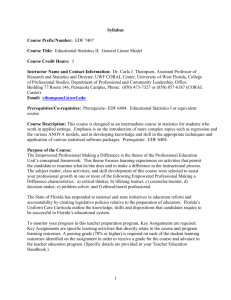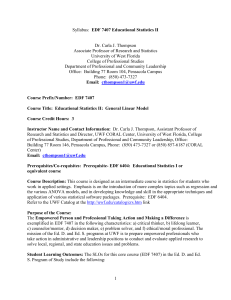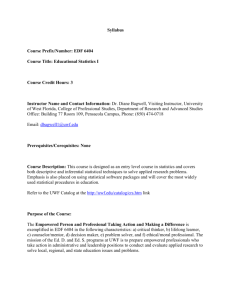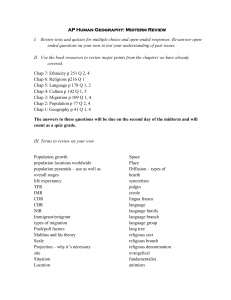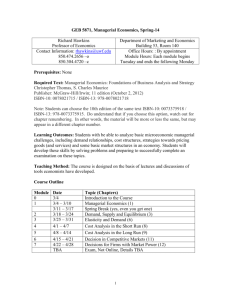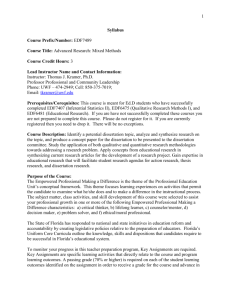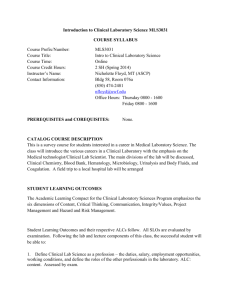Week 6 - University of West Florida
advertisement
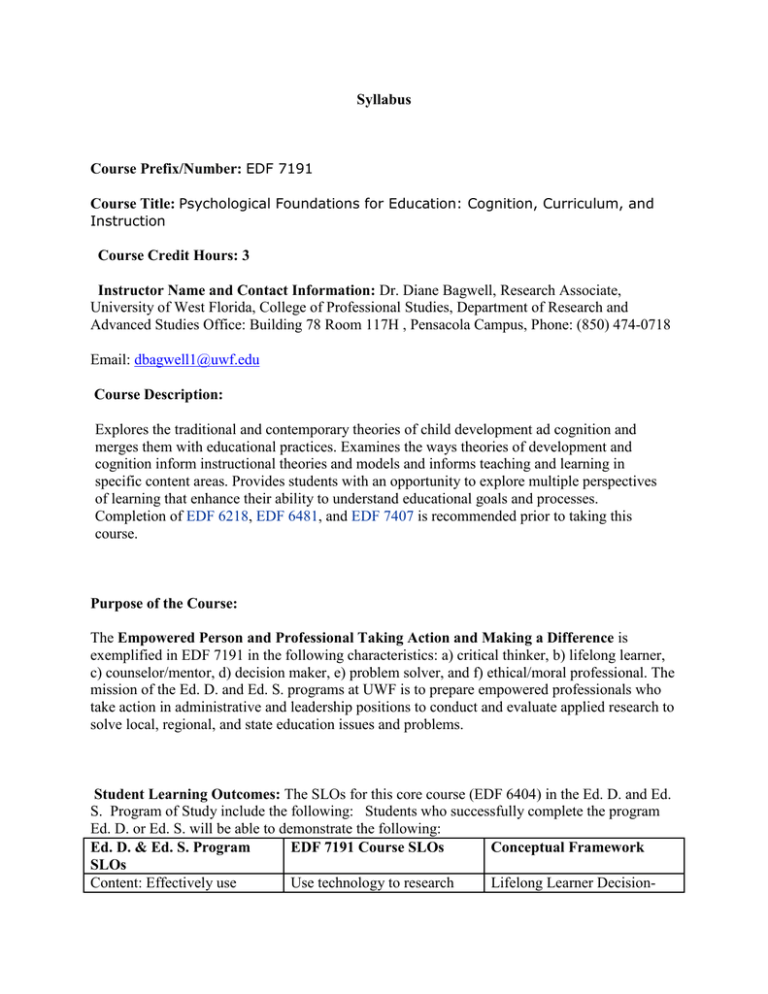
Syllabus Course Prefix/Number: EDF 7191 Course Title: Psychological Foundations for Education: Cognition, Curriculum, and Instruction Course Credit Hours: 3 Instructor Name and Contact Information: Dr. Diane Bagwell, Research Associate, University of West Florida, College of Professional Studies, Department of Research and Advanced Studies Office: Building 78 Room 117H , Pensacola Campus, Phone: (850) 474-0718 Email: dbagwell1@uwf.edu Course Description: Explores the traditional and contemporary theories of child development ad cognition and merges them with educational practices. Examines the ways theories of development and cognition inform instructional theories and models and informs teaching and learning in specific content areas. Provides students with an opportunity to explore multiple perspectives of learning that enhance their ability to understand educational goals and processes. Completion of EDF 6218, EDF 6481, and EDF 7407 is recommended prior to taking this course. Purpose of the Course: The Empowered Person and Professional Taking Action and Making a Difference is exemplified in EDF 7191 in the following characteristics: a) critical thinker, b) lifelong learner, c) counselor/mentor, d) decision maker, e) problem solver, and f) ethical/moral professional. The mission of the Ed. D. and Ed. S. programs at UWF is to prepare empowered professionals who take action in administrative and leadership positions to conduct and evaluate applied research to solve local, regional, and state education issues and problems. Student Learning Outcomes: The SLOs for this core course (EDF 6404) in the Ed. D. and Ed. S. Program of Study include the following: Students who successfully complete the program Ed. D. or Ed. S. will be able to demonstrate the following: Ed. D. & Ed. S. Program EDF 7191 Course SLOs Conceptual Framework SLOs Content: Effectively use Use technology to research Lifelong Learner Decision- appropriate technologies to support practices central to the areas of specialization Project Management: Conduct high-quality applied research pertinent to local, regional, state, and national needs theorists/theories in child development and cognition Maker Problem-Solver Organize theories according to a timeline and to how they relate to each other Critical Thinking: Design, conduct, and evaluate educational and training programs Integrity/Ethics: Conduct oneself in a manner that embodies professional ethics and ideals Communication: Anticipate, adapt to, and manage educational and organizational change Compare and contrast theories and discuss their application to the areas of education Explore ethics of studies conducted by the theorists studied in this course Counselor/Mentor DecisionMaker Problem-Solver Critical thinker Lifelong Learner Ethical/Moral Professional Decision-Maker ProblemSolver Critical thinker Ethical-Moral Professional Decision-Maker Develop skills for identifying and aligning theories with specific scenarios Counselor/Mentor DecisionMaker Problem-Solver Ethical/Moral Professional Goals: Florida Subject Area Competencies & Skills: FELE Florida Educator Accomplished Practices: (Professional) Reading Competencies: NA Sunshine State Standards: NA ESOL Competencies: NA Competency Alignment Matrix: Course Alignments by Assessments, Outcomes, and Standards: Advanced Programs for Other School Personnel EDF 7191 Psy Found./Cogniton/Curr./Instruction Midterm (Rubric) Conceptual Framework Outcomes Critical Thinker Decision Maker Problem Solvers Ethical/Moral Professional NCATE Standards FEAPs 1, 2, 4 1, 2, 4, 6, 8, 10, 12 Final (Rubric) Critical Thinker Decision Maker Problem Solvers Ethical/Moral Professional 1, 2, 4 1, 2, 4, 6, 8, 10, 12 FELE Subject Area Competencies Accountability Assessment Ethical Leadership DecisionMaking Technology Community Partnerships Accountability Assessment Ethical Leadership DecisionMaking Technology Community Partnerships Program SLOs Content Project Management Integrity Communication Critical Thinking Major Topics and Readings: The following topics and readings are listed here and lineated on the course calendar: (Note – readings are from the course text) I. Terminology Related to Theory (Chapter 1) II. Content of Theories (Chapter 2) III. Freud (Chapter 3) IV. Erikson (Chapter 4) V. Skinner (Chapters 5) VI. Bandura (Chapter 6) VII. Piaget (Chapter 7) VIII. Vygotsky (Chapter 8) IX. Information Processing (Chapter 9) X. Humanistic Theories (Chapter 10) XI. Bronfenbrenner (Chapter 11) XII. Kohlberg (Chapter 12) Tentative Schedule: EDF 7191: Psy Foundations Monday Week 1 Jan. 6 Assignment 1 due Reading: Chap 2 and 4 Assignment 2 Week 3 Jan. 20 Friday Saturday Sunday Reading: Chap 1 and 3 Assignment 1 Week 2 Jan. 13 Tuesday Wednesday Thursday Assignment 2 due Reading: Chap 5 Assignment 3 Assignment 3 due Week 4 Reading Chap 6 Jan. 27 Assignment 4 Assignment 4 due Week 5 Feb. 3 Reading Chap 7 Assignment 5 due Assignment 5 Week 6 Feb. 10 Reading: Chap 8 Assignment 6 Week 7 Assignment 6 due No Required Reading Feb. 17 Midterm due Begin working on your midterm Week 8 Feb. 24 Reading Chap 9 Assignment 7 due Assignment 7 Week 9 Mar. 3 Reading Chap 10 Assignment 8 due Assignment 8 Week 10 Mar. 10 No Readings Assigned Spring Break Week 11 Mar. 17 Reading Chap 11 Assignment 9 Week 12 Mar. 24 Assignment 9 due Reading Chap 12 Assignment 10 Week 13 Mar. 31 No Reading Assigned Assignment 10 due Week 14 Apr. 7 Begin working on final assessment No Readings Week 15 Apr. 14 Week16 Apr. 21 Continue working on final assessment Final Assessment Due Texts: Required: Text and Materials: Students will need the following text and materials: (a) Thomas, R. M. (2005) Comparing Theories of Child Development (6th. ed.). Belmont, CA: Wadsworth Cengage Learning. (b) Access to Internet and/or UWF library system for article acquisition. (c) APA (2001). Publication Manual of the American Psychological Association (6th ed). Washington, DC: APA. Assignments: A total of 10 assignments are required for this course. Midterm Assessment: The midterm assessment will be available during week 7. Final Assessment: The final assessment will be available in week 13 and due in Week 15. Assignments and Responsibilities: The following list of assignments and responsibilities for students are presented here and on the course calendar: (1) Readings each week…………………………………………………………… 0 points (2) Assignments @ 10 points each………………………………………………...100 points (3) Midterm Assessment…………………………………………………………..100 points (4) Final Assessment………………………………………………………………100 points Total 300 points Grading Scale: 300-285=A 284-271=A- 270 – 260=B+ 259 – 249 =B 248 – 238= B- Below 238= C Special Technology Utilized by Students: Each UWF Student is expected to: • activate a UWF ArgoNet email account • access email two to three times weekly • have basic word processing knowledge Optional Course Technology 100% of the course work requires use of software available from an ArgoNet-enabled computer or equivalent. Plagiarism Policy: (Word Format) | (PDF Format) | (RTF Format) Student Handbook: (PDF Format) Statement of the University Policy on Academic Conduct: The Student Code of Conduct sets forth the rules, regulations and expected behavior of students enrolled at the University of West Florida. Violations of any rules, regulations, or behavioral expectations may result in a charge of violating the Student Code of Conduct. It is the student’s responsibility to read the Student Code of Conduct and conduct themselves accordingly. You may access the current Student Code of Conduct at http://www.uwf.edu/judicialaffairs. Expectations for Academic Conduct/Plagiarism Policy: Academic Conduct Policy: (Web Format) | (PDF Format) (RTF Format) Assistance: Students with special needs who require specific examination-related or other course-related accommodations should contact the Student Disability Resource Center (SDRC), sdrc@uwf.edu, 850.474.2387. SDRC will send an email to the instructor that specifies any recommended accommodations. UWF TurnItIn notice: UWF maintains a university license agreement for an online text matching service called TurnItIn. At my discretion I will use the TurnItIn service to determine the originality of student papers. If I submit your paper to TurnItIn, it will be stored in a TurnItIn database for as long as the service remains in existence. If you object to this storage of your paper: 1. You must let me know no later than two weeks after the start of this class. 2. I will utilize other services and techniques to evaluate your work for evidence of appropriate authorship practices.
